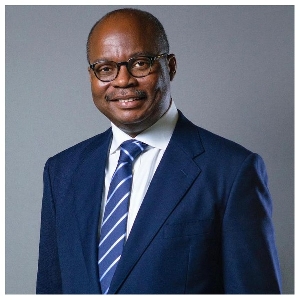 Bank of Ghana Governor, Dr Ernest Addison
Bank of Ghana Governor, Dr Ernest Addison
Dr. Ernest Addison, the Governor of the Bank of Ghana (BoG), has expressed unwavering optimism regarding the nation’s economic recovery, despite the challenges ahead.
His remarks came during a joint press conference with the International Monetary Fund (IMF) following the successful completion of the first review of Ghana’s US$3billion, a three-year Extended Credit Facility (ECF) arrangement by the Fund’s Executive Board.
Dr. Addison emphasised the critical need for executing necessary structural reforms to bolster the economy’s resilience and ensure its long-term sustainability.
“Although a challenging year confronts us, we remain confident about the ongoing economic recovery process and would want to stress the importance of executing the needed structural reforms to support a better functioning of the economy.”
The IMF recognised the country’s strong performance under the programme, noting that all quantitative performance criteria for the first review, along with almost all indicative targets and structural benchmarks, were met.
In a statement after the meeting, the Fund praised Ghana’s commitment to lowering the fiscal primary deficit by approximately 4 percentage points of GDP in 2023 and expanding social protection programmes to mitigate the impact of the crisis on vulnerable populations.
The successful completion of the first ECF review is a significant milestone, leading to an immediate disbursement of SDR451.4million (approximately US$600million), bringing Ghana’s total disbursements under the arrangement to about US$1.2billion. This financial boost is crucial as the country emerges from economic challenges exacerbated by external shocks and pre-existing fiscal vulnerabilities.
Looking ahead to 2024, Dr. Addison outlined his expectations, stating: “Inflation is expected to ease further, underpinned by the continued implementation of sound policies until inflation expectations are firmly anchored toward our single-digit objective”.
He referenced the success of 2023, where a strong reduction in inflation and robust growth were observed.
Dr. Addison assured the public that the banking sector remains sound, liquid and profitable. He stressed the need for continued monitoring of banks’ capital restoration efforts, especially in the aftermath of the Domestic Debt Exchange Programme (DDEP).
The governor anticipates early recapitalisation to promote banking sector resilience and effective financial intermediation, expediting macroeconomic recovery.
Reflecting on recent inflation trends, Dr. Addison said: “A year ago at this time, inflation was at around 54 percent. Through strong and innovative policies, tight monetary conditions and relative exchange rate stability, inflation has been more than halved by the end of 2023 and is currently reported at 23 percent”.
Several factors have contributed to the disinflation process, including the monetary policy stance throughout 2023, stable crude oil prices leading to stable fuel prices, a relatively stable exchange rate environment, stronger foreign exchange reserve accumulation due to the gold-for-reserve programme, and favourable climatic conditions impacting the food supply chain.
The successful completion of the first review of the ECF Arrangement with the IMF is seen as a positive step forward for Ghana’s economic recovery post-pandemic. A crucial precursor to the IMF’s approval was the successful debt restructuring deal with official creditors, granting a moratorium on debt payments until May 2026 and setting the stage for a potential Eurobond revamp by March 2024.
Under the terms of the agreement, US$5.4billion of bilateral debt will be deferred, with repayments split over 16-17 years starting in 2039. Additionally, US$2.8billion of bilateral obligations will be exempt from debt service payments between 2023 and 2026, providing immediate financial relief.
As the country looks to the future, Dr. Addison is advocating vigilance and commitment to undertake all the structural reforms envisaged under the programme.